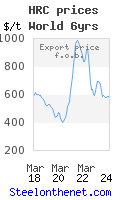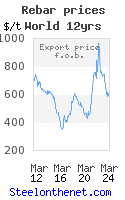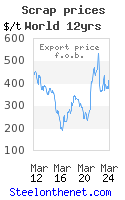Peabody to Invest In Chinese Mines [BlackDiamond]
Peabody eyes investment in Chinese coal mines
BEIJING, Sept 20 (Reuters) - U.S. coal miner Peabody Energy Corp. plans to invest in Chinese collieries and build an import-export business there, aiming to make the country a significant contributor to earnings within a decade, a top executive said on Tuesday.
The largest U.S. coal company hopes to capitalise on growth in Chinese coal demand, which it expects to be up to 80 percent over the next 15 to 20 years, outstripping expansion in its home market.
"Our initial goals are to improve our understanding of the coal and energy markets ... increasing our sales and marketing presence through an import-export strategy," said Chief Financial Officer Richard Navarre.
"Ultimately we do look longer term to invest in assets; possibly through joint ventures would be the most efficient route," he added at a news conference before the opening of the firm's Beijing office.
Peabody, which in July said its second-quarter profit had more than doubled on sky-high prices and demand, would be interested in taking 10 to 45 percent stakes in Chinese firms.
"Our hopes and expectations would be that in five to 10 years (China) would be a meaningful part of our business," Navarre said. He declined to comment further, but said the firm expected to be able to give more details within a year.
In May the firm made a U.S. regulatory filing for periodic sales of up to $3 billion in securities and said it might use some of the proceeds for acquisitions.
MINORITY STAKE
Navarre said Peabody was only in talks with a small group of firms, but was open to a range of investment possibilities and would be most interested in a greenfield project.
"In a smaller investment we'd take up to a 45 percent position. If it's a multi-risk, very large project we may end up with multiple partners ... and we would only have a 20 to 25 percent (holding)," he said.
"We probably wouldn't be interested in anything less than 10 percent," he added, saying that he understood that the government limited foreign investment in this sector to minority stakes.
Navarre said Peabody could offer larger Chinese partners its expertise in mining techniques and safety, particularly surface mining technology, which he said currently accounted for a relatively small portion of China's coal output.
At present it sells coal to China only indirectly through Australian subsidiaries.
Peabody will also be looking north to opportunities in Mongolia, although poor transport -- a global problem for the coal industry -- could hinder development there.
"The difficulty in Mongolia is that there is no infrastructure to move the coal into China, so it will take time to develop those resources," Navarre said.
India was another key growth area for coal industry, together with China and U.S. accounting for an expected 90 percent of coal demand growth in the next 15 to 20 years, Navarre said, although the firm was currently focused on China.
"We are not yet looking seriously at India ... There are enough opportunities in China to keep our plate fairly full," he said.
BEIJING, Sept 20 (Reuters) - U.S. coal miner Peabody Energy Corp. plans to invest in Chinese collieries and build an import-export business there, aiming to make the country a significant contributor to earnings within a decade, a top executive said on Tuesday.
The largest U.S. coal company hopes to capitalise on growth in Chinese coal demand, which it expects to be up to 80 percent over the next 15 to 20 years, outstripping expansion in its home market.
"Our initial goals are to improve our understanding of the coal and energy markets ... increasing our sales and marketing presence through an import-export strategy," said Chief Financial Officer Richard Navarre.
"Ultimately we do look longer term to invest in assets; possibly through joint ventures would be the most efficient route," he added at a news conference before the opening of the firm's Beijing office.
Peabody, which in July said its second-quarter profit had more than doubled on sky-high prices and demand, would be interested in taking 10 to 45 percent stakes in Chinese firms.
"Our hopes and expectations would be that in five to 10 years (China) would be a meaningful part of our business," Navarre said. He declined to comment further, but said the firm expected to be able to give more details within a year.
In May the firm made a U.S. regulatory filing for periodic sales of up to $3 billion in securities and said it might use some of the proceeds for acquisitions.
MINORITY STAKE
Navarre said Peabody was only in talks with a small group of firms, but was open to a range of investment possibilities and would be most interested in a greenfield project.
"In a smaller investment we'd take up to a 45 percent position. If it's a multi-risk, very large project we may end up with multiple partners ... and we would only have a 20 to 25 percent (holding)," he said.
"We probably wouldn't be interested in anything less than 10 percent," he added, saying that he understood that the government limited foreign investment in this sector to minority stakes.
Navarre said Peabody could offer larger Chinese partners its expertise in mining techniques and safety, particularly surface mining technology, which he said currently accounted for a relatively small portion of China's coal output.
At present it sells coal to China only indirectly through Australian subsidiaries.
Peabody will also be looking north to opportunities in Mongolia, although poor transport -- a global problem for the coal industry -- could hinder development there.
"The difficulty in Mongolia is that there is no infrastructure to move the coal into China, so it will take time to develop those resources," Navarre said.
India was another key growth area for coal industry, together with China and U.S. accounting for an expected 90 percent of coal demand growth in the next 15 to 20 years, Navarre said, although the firm was currently focused on China.
"We are not yet looking seriously at India ... There are enough opportunities in China to keep our plate fairly full," he said.




0 Comments:
Post a Comment
<< Home